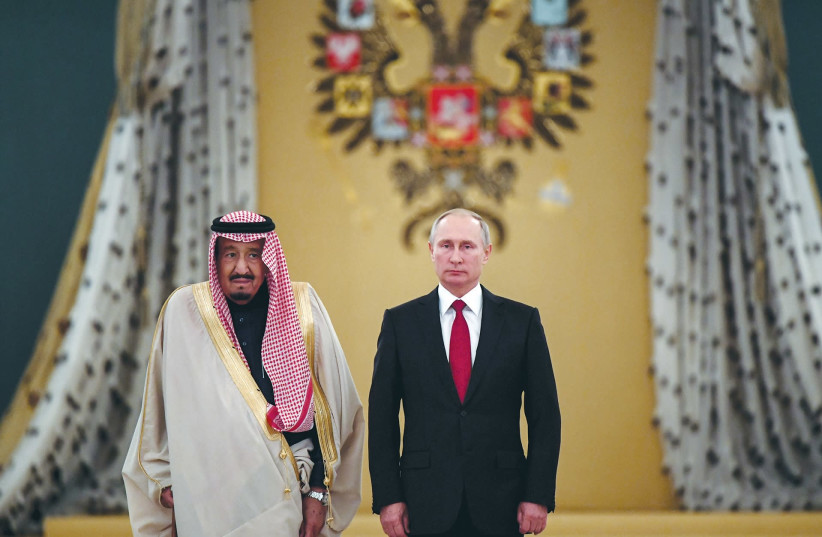On the sidelines of the St. Petersburg Economic Forum last June, Saudi Energy Minister Prince Abdulaziz bin Salman said relations between the kingdom and Russia are as warm as the weather in Riyadh. This description summarizes the current state of strategic cooperation between the two countries. This state of affairs angers Riyadh’s strategic allies in the West, primarily, of course, the United States.
But it remains the best option for Saudi foreign policy in light of overall circumstances and the realities of the existing world order. Of course, everyone in the region and internationally is waiting to see the results and implications of US President Joe Biden’s visit to Saudi Arabia, last month.
In particular, there were unspoken expectations or aspirations that Saudi Arabia might oblige its US partner by increasing oil production in isolation from its OPEC+ fellow members, although Riyadh has repeatedly stressed that this issue is not on the table.
Then there was a recent telephone conversation between Russian President Vladimir Putin and Saudi Crown Prince Mohammed bin Salman confirming that this influence is limited, if not absent altogether.
What are the changes?

The strategic vision of oil-producing countries, both within and outside OPEC, particularly Saudi Arabia, the UAE and Russia, is certainly based on an objective view of markets and the need to maintain their stability and balance. This is critical for both exporters and consumers.
Meanwhile, the US and its Atlantic allies are under tremendous domestic economic pressure from policies for that others are not responsible. They want to subordinate the policies of oil producers to those policies and use that production to isolate and punish Russia. These are things that others have nothing to do with.
In fact, they expose the interests of their states and peoples to significant strategic losses. The recent conversation was not only an affirmation of the strength of the Saudi-Russian relationship, but also underscored how committed Saudi oil policy is to maintaining balance in energy markets. This is consistent with the Kingdom’s status and growing global strategic weight.
I think the problem with US foreign policy right now is that executive and legislative policymakers are unwilling to acknowledge the changes that are taking place, whether in the status and global standing of the US or its traditional allies. They only want to maintain the outdated equations on which those alliance relationships were based.
Times have changed, yet they fail to change with the times. This alliance should be addressed realistically rather than continuing to operate under the old vision that no longer reflects reality of international relations. Another US problem in this context is unilateralism.
This overly self-serving behavior is forcing many allies to rethink this alliance or at least structure it according to a new framework that takes into account evolving strategic variables. Washington has demonstrated its propensity to abandon its allies in any crisis.
THERE IS a serious tendency to plunge some allies into fateful and perhaps existential crises, as Washington only considers its interests and conflicts with strategic adversaries and rivals. The point here is not to justify the new orientations of Washington’s allies in the Gulf region; rather, it is an attempt to understand the overall context of events.
These developments are influenced by what is happening around them at the global level, as they reflect the growing strategic interests of these allies, interests that require building a broad global network of cooperative relationships with all emerging international powers because their interests and commonalities overlap with all of them.
One of the most important commonalities is the coordination between Saudi Arabia and Russia to maintain the stability and balance of oil markets, and to account for the interests of both producers and consumers. Needless to say, the US recognizes the importance of keeping the channels of communication open to all.
They strive to do so, whether in relations with China or with Russia, despite all the tensions and difficult circumstances that those relations go through. But when it comes to the foreign policy of other countries, Washington believes that this ally should say no to any other partnerships that contradict what the American side sees. These behavioral tendencies seem overly selfish. They pose the biggest threat to the continuity of the historic alliance relationships between the US and its GCC allies.
Even Israel, Washington’s closest and most influential strategic ally in the Middle East, has not fared unscathed by this practice. We have seen the differences that arise from time to time from the tumultuous development of Israeli-Chinese relations.
The only way out of this American dilemma is not to constantly try to disrupt or restrict Russian-Saudi or Russian-Gulf relations. This is a far-fetched fictional scenario, at least in light of current realities and circumstances. It is to evolve US strategic concepts of international relations and to form new conceptions of partnership and alliance with other countries. These relationships need to respond to the changes and circumstances of the times and to US circumstances, interests and real needs. They need to move away from overestimating or underestimating both its own capabilities and the capabilities of others to move and maneuver politically and strategically.
Quite simply, the US must recognize that the rules of international relations have shifted in the mid-twentieth century. Maintaining alliances and partnership relationships mandates attention to the interests of both sides.
It requires mutual respect and recognition, great flexibility, a more realistic view and consideration of variables, and evidence of strong interdependence between strategic partners. Saudi-Russian relations are advancing. Day by day, they prove that they have elements of strength and continuity.
This does not detract from the importance of Saudi-US relations. But Washington must seriously address the current geopolitical variables. It must recognize that the Gulf is not just about oil but also about a wide web of mutually strategic interests.
